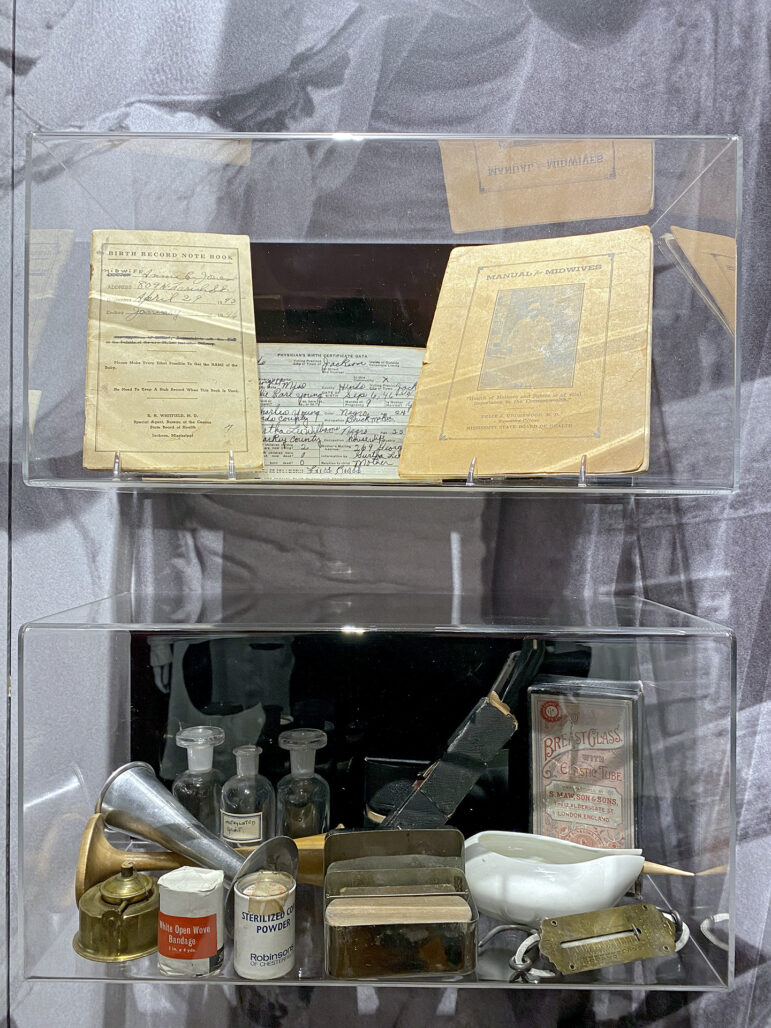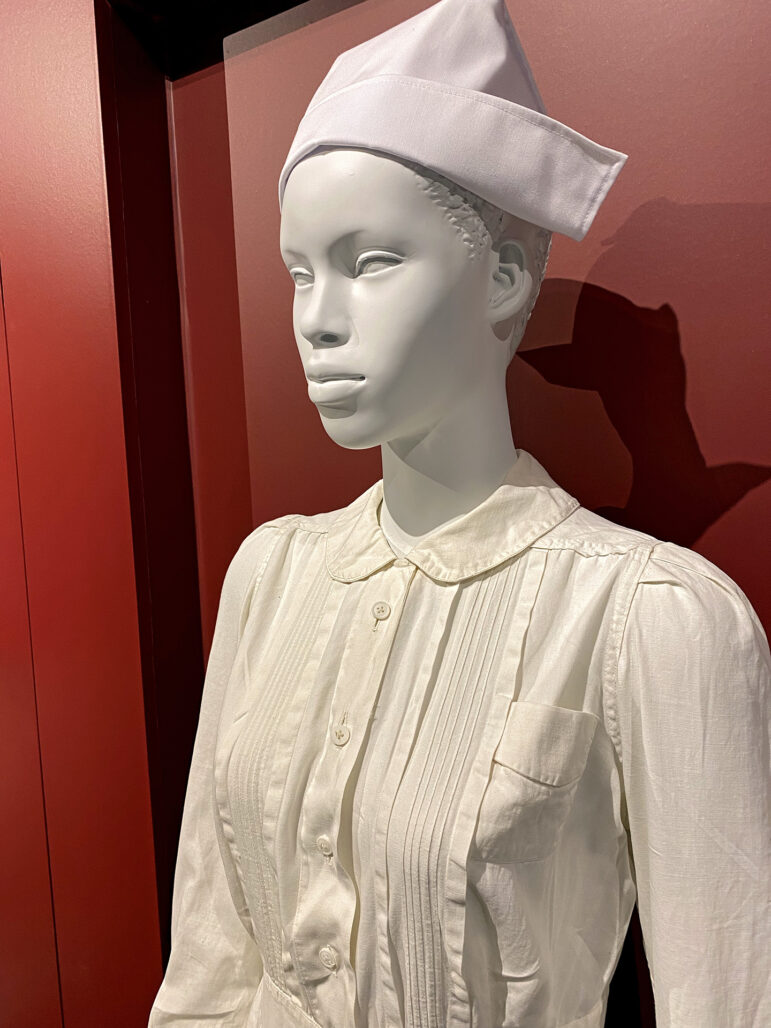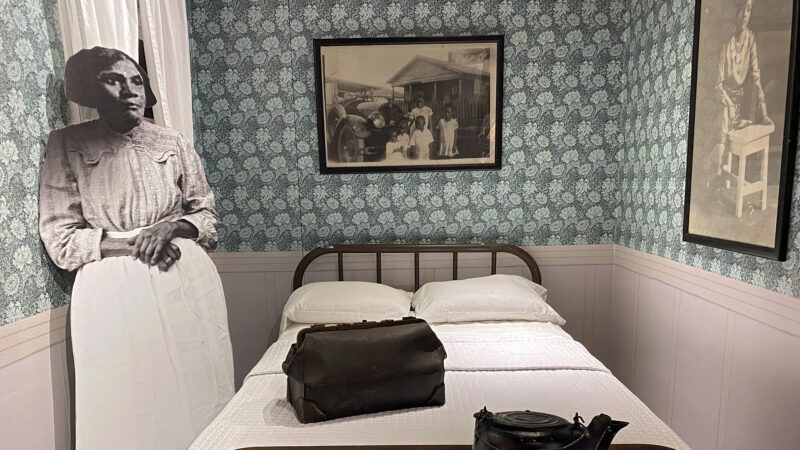As midwifery evolves, this Mississippi museum is preserving the history of granny midwives
A section of the Scott Ford House Permanent Exhibit shows how granny midwives facilitated home births in rooms similar to the one shown here at the Smith Robertson Museum and Cultural Center in Jackson, Mississippi, on Feb. 11, 2023.
On a slow Saturday in February, Aurelia Harden, her mother, Marilyn, and her daughter, Jamaria, arrived for a visit to the Smith Robertson Museum and Cultural Center in downtown Jackson, Mississippi.
They’re in town for a show choir competition, but first, they’re stopping at the museum, which was the site of the Smith Robertson School — the first public school for African Americans in Jackson — before being converted into its current educational form. Today’s lesson? Midwives.
Last fall, the museum opened the Scott Ford House Permanent Exhibit to tell the story of granny midwives — the term used for Afircan-American midwives in the South following Emancipation —and how midwives came to be in Mississippi. It highlights everything from historical events, like when enslaved women were brought to America from West Africa, to influential figures like the Scott-Ford family — a mother-daughter duo who delivered babies out of their homes.
The exhibit aims to share the history of midwifery in the South as present-day midwives continue to evolve the scope of its practice.

“When we opened this exhibit, we had women who came through who were birthed by midwives. They remember those years growing up seeing the midwives come back to check to make sure everything was OK,” Gwen Harmon, the manager and curator for educational exhibits at the museum, said. “Then there were others who had family members who were midwives. That was such a joy for us to see them go back and reminisce.”
The Hardens, who are Black, were contemplative while looking at each section of the exhibit, including one that tells the story of those enslaved women. There are bundles of cotton and replicas of cotton gins and other farm equipment on short tables. Marilyn is only 65, but she remembered what it was like to work in the cotton fields during the summer.
She also recalled stories of women having babies in those same fields.
“You wouldn’t expect the farmer to come out, but a lot of times, we did have to deliver a baby if the midwife didn’t show up,” Marilyn said. “The grandparents or somebody had to deliver in the field.”
This museum is a small part of the deeper history of this area of Jackson. It’s just a few blocks over from Farish Street, which was once the Black epicenter of the city. Harmon said that it’s impossible to talk about Mississippi’s granny midwives without mentioning the Farish District.
“It’s all Black. It’s Black cultural, it’s Black historical,” Harmon said. “Farish used to be the hub of African-American physicians, pharmacies, retailers, restaurants.”
Both Marilyn and Aurelia are educators in Florida, a state that has come down hard against teaching about race or African-American history over the past year. As she looked over the midwifery exhibit, Marilyn said it is vital to seek out Black history.
“You know, they want to infuse what they teach, that other history, somebody else’s history, but they don’t want you to know your history or take a class in it,” she said.
Mary Scott, and her daughter, Virginia Ford, owned two homes on Cohea Street, which intersects Farish, and is just a short walk from where the museum currently sits. Scott, formerly enslaved, worked as a maid and owned a laundry service, while Ford was a midwife. They used their homes to care for mothers and teach women to be midwives during an era where maternal care for Black women was limited.
In the Jim Crow South, most hospitals would not accept Black patients. Black women, and sometimes poor white women, would call on granny midwives to deliver their babies at home. But by the mid-20th century, they were being edged out of practice.

“There are other entities that came before who find that maybe that’s an encroachment on what they had been doing — pretty much the majority white medical profession — because they started putting a lot of limitations on the midwives,” Harmon said.
Those limitations included the ability to prescribe medicines, courses they took, how to keep patients’ records, and even what the midwives wore.
“What they were hoping for was that it would reduce black women becoming midwives, and it did have an impact on that number,” Harmon said. “The numbers did start to drop, as you can imagine.”
So did the communities around Farish Street.
Harmon said that in the late ‘70s, with the area shrinking, the city almost closed the Smith Robertson School. Alferdteen Harrison was pivotal in founding the museum then, and she’s been instrumental in the Scott Ford Houses preservation efforts now. A descendant of the Scott Ford family donated the two homes to the museum.
Harmon says there are plans to transform one of the homes into a walking exhibit. She urges others to search their family archives and attics for artifacts of what their ancestors accomplished to preserve those stories for future generations.
“It’s a wealth of knowledge,” Harmon said. “Look at your museums and go and see about donating those items and creating an exhibit of some sort so that the world can understand how important it was.”
And for Jamaria Harden, the exhibit gives her something to aspire to while she’s growing into her own legacy.
“For them, they didn’t give up, and they still had to do what they had to do,” Jamaria said. “I feel like they’re lowkey superheroes.”
This story was produced by the Gulf States Newsroom, a collaboration between Mississippi Public Broadcasting, WBHM in Alabama, WWNO and WRKF in Louisiana and NPR. Support for reproductive health coverage comes from The Commonwealth Fund.
Team USA faces tough Canadian squad in Olympic gold medal hockey game
In the first Olympics with stars of the NHL competing in over a decade, a talent-packed Team USA faces a tough test against Canada.
PHOTOS: Your car has a lot to say about who you are
Photographer Martin Roemer visited 22 countries — from the U.S. to Senegal to India — to show how our identities are connected to our mode of transportation.
Looking for life purpose? Start with building social ties
Research shows that having a sense of purpose can lower stress levels and boost our mental health. Finding meaning may not have to be an ambitious project.
Sunday Puzzle: TransformeR
NPR's Ayesha Rascoe plays the puzzle with listener Joan Suits and Weekend Edition Puzzlemaster Will Shortz.
Danish military evacuates US submariner who needed urgent medical care off Greenland
Denmark's military says its arctic command forces evacuated a crew member of a U.S. submarine off the coast of Greenland for urgent medical treatment.
Only a fraction of House seats are competitive. Redistricting is driving that lower
Primary voters in a small number of districts play an outsized role in deciding who wins Congress. The Trump-initiated mid-decade redistricting is driving that number of competitive seats even lower.






